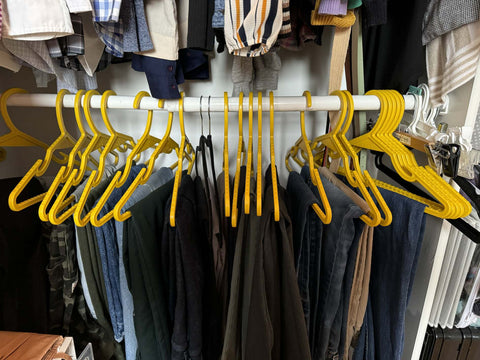Before we even start, always always always check your city or recycling provider because recycling varies from city to city.

Clothing hangers are one of those everyday items we rarely think about…until we have way too many of them, not enough of them, or they all keep breaking (and why does that always happen at the same time?).
Our closets are overflowing with plastic, wooden, wire, and felt hangers collected from retail stores, dry cleaners, or old clothing purchases.
At some point, they will break and most of us beg the question: can I recycle these things?
The answer, of course, is not straightforward.
Hangers come in different materials and recycling rules vary depending on where you live.
are hangers recyclable in general?

The big question here: are any hangers recyclable at all?
It depends entirely on the material:
-
Plastic hangers: usually not recyclable via your curbside bin, but may be accepted by specialty recycling centers
-
Wire hangers: recyclable as scrap metal, but not in your curbside bin
-
Wooden hangers: not recyclable in most cases, especially if they’re coated, stained or laminated
-
Velvet, felt or fabric-covered hangers: typically not recyclable due to mixed materials.
The key takeaway here: most household recycling programs do not accept hangers of any kind.
Roughly 85% of hangers bought each year end up in landfills, (that’s close to 34 billion!) So it’s clear that this branch of the plastic pollution problem needs a creative solution.
so, why aren’t plastic hangers recyclable?

The short answer is: plastic hangers are not easily recyclable in curbside blue bins for a few main reasons:
-
mixed materials in the makeup of the hanger
-
low-quality plastic
-
recycling system limitations
These caveats make recycling hangers relatively difficult. Though technically and theoretically possible, most facilities won’t take them.
The majority of the plastic hangers we buy are made from a mix of materials, commonly polystyrene (#6 plastic) or polycarbonate.
These types of plastic are technically recyclable, but because hangers are often made with mixed materials like metal hooks or rubber grips, most recycling facilities don’t accept them.
Their awkward shapes also tend to jam up machinery.
Recycling is a tricky thing in general.
When we put our recycling bin at the curb, it’s out of sight out of mind. You put that container in the recycling bin and now it’s not your problem.
-
That’s called wishcycling — putting something into the recycle bin with the hope it will be recycled.
-
Many of us don’t realize what it takes logistically to break down certain products and recycle them in these types of facilities.
Real people and real machines are collecting these items, sorting through them, and breaking them apart to make them useful again.
The more materials, the more impossible that job becomes.
In fact, tossing plastic hangers into your curbside bin can actually cause more harm than good. They can damage sorting equipment, contaminate recycling batches, and increase costs for recycling facilities. Oops!
When recycling facilities receive loads that are heavily ‘contaminated’ (i.e. non-recyclable/wishcycled items) entire batches get diverted to the landfill.
Looking at you plastic bags in the recycle bin.
but wait, are wire and wood hangers recyclable?

Wire hangers are slightly different.
pro: They’re made of steel, which is a highly recyclable material.
con: However, wire hangers usually don’t belong in curbside recycling bins either.
-
They are thin and bendable
-
They tangle up in machinery
-
They have been known to break and damage recycling equipment
Wood hangers are also not recyclable because they’ve been treated with a finish that essentially ‘contaminates’ the wood.
While it started as a natural, compostable material in its raw form the added chemicals from stains and varnishes make that null and void.
But the good news about wire hangers is there are lots of places besides the bin that you can recycle them!
A few ways to recycle hangers include:
-
Dry cleaners → many dry cleaners will gladly take back wire hangers for reuse
-
Scrap metal recyclers → scrap yards or metal recycling centers will take them
-
Donation centers → thrift stores may accept them if they’re in good condition
-
Churches & local rescues → wood hangers in particular are good for coats so look for organizations that pass through lots of jackets.
If you’re like me and you’ve accumulated dozens of wire hangers from the dry cleaner, try bringing them back for your next visit before throwing them away.
How long do hangers last in a landfill?
Most plastic hangers can take hundreds of years to break down, leaching microplastics into the environment along the way. Wood hangers are usually coated with chemicals, making them non-compostable. Multiply that by billions, and you’ve got a hanger problem that’s literally piling up in our landfills.
So, what can we do?
the best options to recycle hangers as it stands

Fortunately, there are still options to divert what’s in your closet from a landfill!
-
dry cleaners → many will take back both plastic and wire hangers for reuse
-
retailers → some large retailers like Target or H&M have had in-store recycling programs. Check with your local store to see if they’re active and accepting. (Programs may vary by location or be paused — but asking helps signal consumer interest.)
-
specialty recycling programs → check your local recycling centers to see if they have drop-off options for hangers. Some do!
-
local neighborhood groups → check groups like Facebook marketplace or other ‘buy nothing’ neighborhood groups.
-
terracycle → offers mail-in zero-waste boxes that accept hangers to address this exact problem. Terracycle can have a long wait time so check locally as some regional programs may also accept them.
-
scrap metal facilities → wire hangers can often be bundled together and dropped off at scrap metal recycling yards.
-
( r e )x → we can’t recycle other hangers but if on the off chance your ( r e )x hanger breaks, we can take it back and recycle it into a new batch.
what to do with plastic hangers

Instead of recycling them, there are other options to lessen their footprint.
-
Reuse them at home → keep extras in storage for seasonal clothing swaps, use them for laundry, repurpose them for hanging accessories or bags.
-
Upcycle them → find creative DIYs like plant supports in your garden, crafts, or makeshift hooks to use old or broken ones.
-
Donate them → thrift stores, consignment shops, and charity clothing drives often need hangers and will gladly take them off your hands.
-
Avoid accumulating them → choose high quality, durable hangers that won’t break as easily and you’ll never have to replace them.
hanging it up: what to do about the environmental impact of hangers

As much as we want them to be, the hard truth is that most hangers can not be accepted in your average curbside recycling programs.
Plastic hangers are especially tricky due to their low quality, mixed materials. Wire hangers are recyclable only as scrap metal and wooden or fabric hangers are rarely recyclable at all.
This is why finding a transparent partner was so important to us. By knowing exactly where our plastic is coming from (and what type of plastic it is), not only are we helping to remove existing plastic waste from the environment but we’re preventing more from entering by creating 10X sturdier hangers that can be recycled.
Note, we do not recycle hangers because you’ve outgrown the color or don’t want them anymore. We recycle only broken hangers.
Plastic, wire, and wood, oh my.
While they seem small, hangers represent a significant environmental issue.
Not only do a massive number of them end up in landfills every year, but they take hundreds and hundreds of years to decompose.
This is not just a you-and-me problem. The fashion and retail industries play a big role in creating unnecessary plastic waste.
Many garments are shipped to stores with hangers, which are often then discarded immediately upon unpacking in favor of the store's branded hangers. (so wasteful and part of our origin story!)
Even online orders occasionally arrive with cheap hangers tucked inside the package. If that happens, reach out to the brand and ask them not to include hangers in future orders. Brands need feedback and your voice matters.
Just think about all the times you’ve purchased something with a flimsy little hanger. They are quite literally useless. No one wants to hold onto those. (Thanks though!)
Some companies are working on circular solutions like hanger return programs or reusable hanger systems.
The best solution is to reuse, donate, or return hangers whenever it’s possible. By keeping hangers out of landfills, we take one small but meaningful step toward reducing plastic pollution.
key tips for reducing hanger waste

-
Buy clothing without the extra hangers
-
Return hangers to dry cleaners or retail stores
-
Declutter responsibly & donate
-
Look into alternative recycling options like terracycle or metal scrapyards
But all of these are just solutions to the problem after it’s already happened. It’s also important to be proactive and make different purchasing choices.
This is where we come in.
Creating durable hangers made of 100% recycled plastic solves 2 problems:
-
It gets plastic waste out of the ocean & out of landfills
-
It creates a product that is significantly less likely to be wasted, because it really will last forever
Buying products that aren’t just mass-produced and low-quality is not only a better move for your wallet and your lifestyle, it’s a better move for the planet.
So, ( r e )flect before you collect. Take inventory of what you have and reuse or donate what you can.
And if you must buy more hangers, try out our hangers, built to last a lifetime, all while keeping plastic waste out of the environment.
